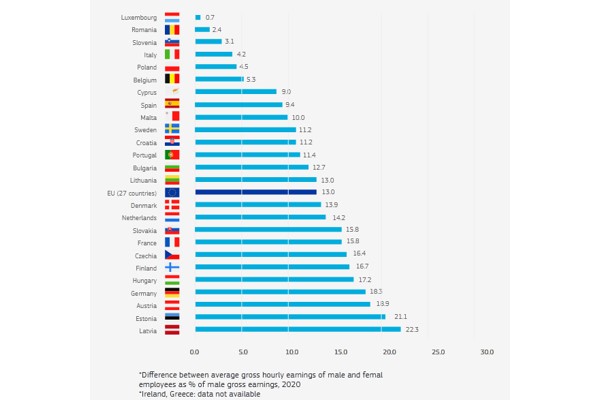 Credit: European Commission
Credit: European Commission
On the occasion of European Equal Pay Day, the European Commission emphasised that pay transparency is essential to close the European Union (EU) gender pay gap.
The EU’s Equal Pay Day in 2022 falls on 15 November. It marks the day when women symbolically stop getting paid compared to their male colleagues for the same job (one and an half months of salary in 2022).
According to the Commission, Women in the European Union still continue to earn less than men for equal job, with the average gender pay gap in the EU standing at 13%. This means that for €1 a man earns, a woman earns €0.87. Progress is constant, but still too slow, with a reduction in the gap of 2.8% in ten years.
Luxembourg, leading the pack in gender pay equality, has recorded the lowest difference of 0.7% between average gross hourly earnings of male and female employees as percentage of male gross earnings in 2020.
Věra Jourová, Vice-President for Values and Transparency, and Helena Dalli, Commissioner for Equality, said: “Equal work deserves equal pay: this is a founding principle of the European Union. Solving the injustice of the gender pay gap cannot come without change to the structural imbalances in society. That is why this Commission doubled down efforts on gender equality and the root causes of pay inequality.
We are now in the final steps to see gender balance on corporate boards becoming a reality across the EU. We have already put new rights in place for women and men to have more choice and to better share caring responsibilities and work. And we count on the Member States to up their game on accessible, affordable, and high-quality early childhood education and long-term care – a prerequisite to support women's participation in the labour market.
We need to empower women so that they can fulfill their potential.
However, an important piece of the puzzle is missing: pay transparency. Transparency contributes towards ending gender bias in pay from the outset and empowers workers to enforce their right to equal pay for the same work or work of equal value. We call on the European Parliament and the Council to adopt our proposed Pay Transparency Directive without undue delay.
Everyone benefits, when all are equal.”
According to the Commission, women often remain unaware about pay discrimination in their work. A lack of wage transparency does not allow a proper assessment of the reasons for pay inequalities.
The Commission therefore adopted a recommendation on strengthening the principle of equal pay between men and women through transparency in March 2014. It provides guidance to help EU countries implement the equal pay principle more effectively and focusses especially on enhancing pay transparency.








